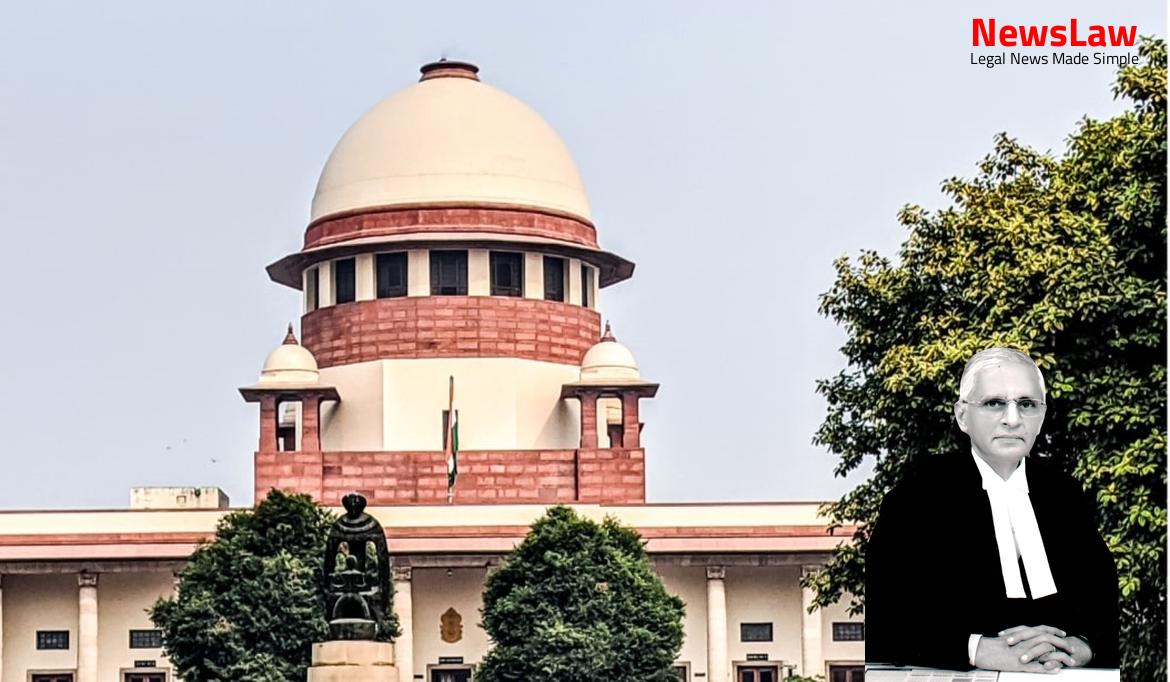In a recent legal case, the court delved into the intricate analysis of proportionality of punishment in disciplinary proceedings. The focus was on determining whether the punishment imposed by the disciplinary authority was justified or disproportionate based on the delinquent’s actions. This summary provides a glimpse into the court’s in-depth legal analysis on the matter, shedding light on the principles governing disciplinary proceedings and the discretion of the disciplinary authority.
Facts
- The learned Single Judge observed that all due opportunities were afforded to the delinquent and the finding of guilt was based on cogent material and evidence from both sides.
- The delinquent was initially imposed the punishment of dismissal, which was later converted to ‘removal from service.’
- The Division Bench of the High Court set aside the judgment and order passed by the Single Judge.
- The Single Judge interfered with the punishment of ‘removal from service’ imposed by the disciplinary authority, citing disparity in punishment between the delinquent and a female constable involved.
- The Single Judge remitted the matter back to the disciplinary authority to impose a lesser punishment in order to allow the delinquent to retain his job.
- The disciplinary authority preferred a writ appeal before the Division Bench against the judgment of the Single Judge.
- ROE submitted by Deputy Adjutant, SFC ordered against delinquent – Head Constable after due consideration
- Opportunity given for cross-examination of prosecution witnesses
- Statements of prosecution and defense witnesses recorded
- Departmental appeal initially rejected as time-barred, later upheld by Appellate Authority
- Appellant pleaded not guilty to charges
- Female constable found guilty in parallel proceedings
Also Read: Ruling on Circumstantial Evidence in Murder Case
Issue
- The issue at hand is whether the learned Single Judge was justified in interfering with the punishment imposed by the disciplinary authority based on the argument of disproportionate punishment.
- Comparison is drawn with a female constable who faced similar disciplinary proceedings and received a lesser punishment.
- The question raised is whether the disparity in punishment justifies interference by the Court.
Also Read: Challenging Legal Presumptions in Negotiable Instrument Cases
Arguments
- The appellant’s counsel argues that the punishment of ‘removal from service’ is disproportionate to the misconduct proved.
- The counsel refers to past court decisions on the interference with punishment imposed by disciplinary authorities.
- The learned Single Judge had previously ruled against the appellant on the disciplinary proceedings.
- The appellant’s counsel seeks to quash the Division Bench’s order and restore the Single Judge’s decision, requesting a lesser punishment.
- Several court decisions on the test of proportionality are cited by the appellant’s counsel.
- The appellant’s counsel highlights the good conduct and accolades received by the delinquent during service, suggesting no bad intention.
- Concerns are raised regarding the procedural irregularities in the Summary Force Court (SFC) proceedings against the appellant.
- The punishment of ‘removal from service’ is deemed excessive compared to the charges laid against the appellant.
- The appellant’s counsel argues for a lesser punishment to enable the delinquent to retain his job.
- The respondents’ counsel supports the punishment imposed by the disciplinary authority, emphasizing the seriousness of the misconduct committed by the appellant.
- The appellants’ alleged misconduct in compromising the security of a female barracks is highlighted, justifying the ‘removal from service’ decision.
- Differences in punishment between the appellant and a female constable are discussed, with the appellant’s counsel claiming disproportionate treatment.
- Further arguments are made regarding the charges and punishments given to the appellant and the female constable.
- The findings of the Single Judge and Division Bench on the disciplinary proceedings are deemed conclusive and not subject to reevaluation by the current court.
- Appellant’s misconduct of entering the Mahila Barrack at midnight jeopardizing security was grave.
- Disciplinary authority was justified in imposing ‘removal from service’ as punishment.
- Comparison with another constable’s misconduct is not relevant for determining appellant’s punishment.
Also Read: Legal Analysis Critique in High Court’s Quashing Order
Analysis
- The appellant, a male Head Constable, was found guilty of entering the Mahila Barrack at midnight which compromised security.
- The Single Judge compared his punishment to a female constable’s lesser penalty, finding it disproportionate.
- The Division Bench overturned the Single Judge’s decision and upheld the ‘removal from service’ penalty.
- The disciplined force member breached rules and compromised security, justifying the severe penalty.
- The disciplinary proceedings were conducted fairly, with ample opportunities for the appellant to defend himself.
- Comparing punishments between employees does not justify reducing a warranted penalty.
- The nature of misconduct determines the penalty, with the role of the employee and charges considered.
- The appellant’s penalty of ‘removal from service’ was based on proven charges and followed SSB Rules.
- Equality in punishment applies when co-delinquents are equally placed and show similar remorse and conduct after charges.
- In disciplinary matters, disciplined force members are expected to follow rules and control their emotions.
- Exception to the principle may be when a co-delinquent receives a lesser punishment for similar charges.
- Judicial review in disciplinary matters is limited to the Wednesbury principles and proportionality.
- Courts should not interfere with the quantum of punishment unless it shocks the conscience of the court.
- The disciplinary authority has discretion to impose suitable punishment based on the gravity of misconduct.
- The High Court/Tribunal should not substitute its own decision on the penalty imposed by the disciplinary authority.
- The misconduct proved against the appellant is not disproportionate to the punishment imposed.
- The present appeal is dismissed.
- No costs are awarded in the circumstances of the case.
Case Title: SRI ANIL KUMAR UPADHYAY Vs. THE DIRECTOR GENERAL SSB (2022 INSC 451)
Case Number: C.A. No.-002707-002707 / 2022



